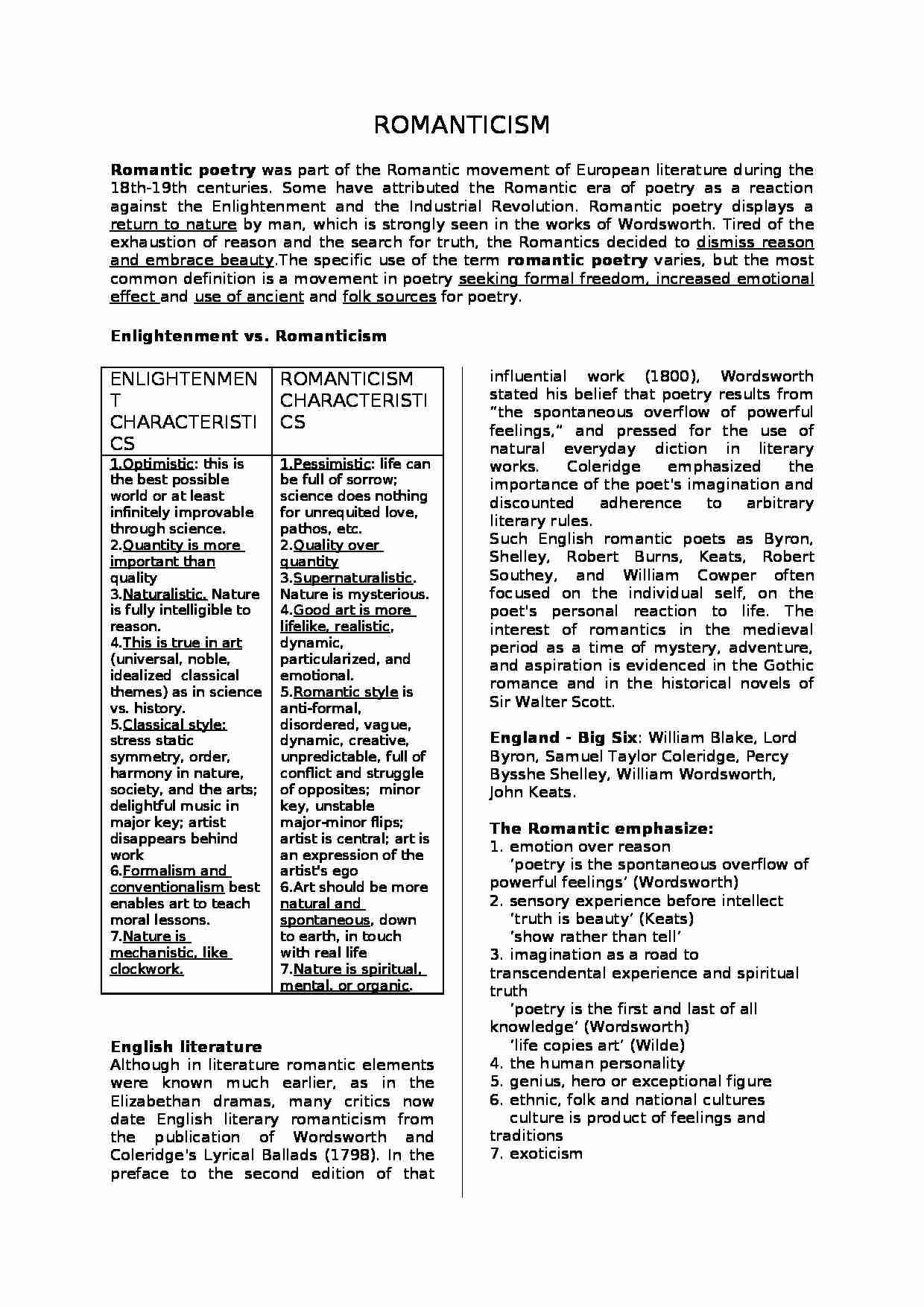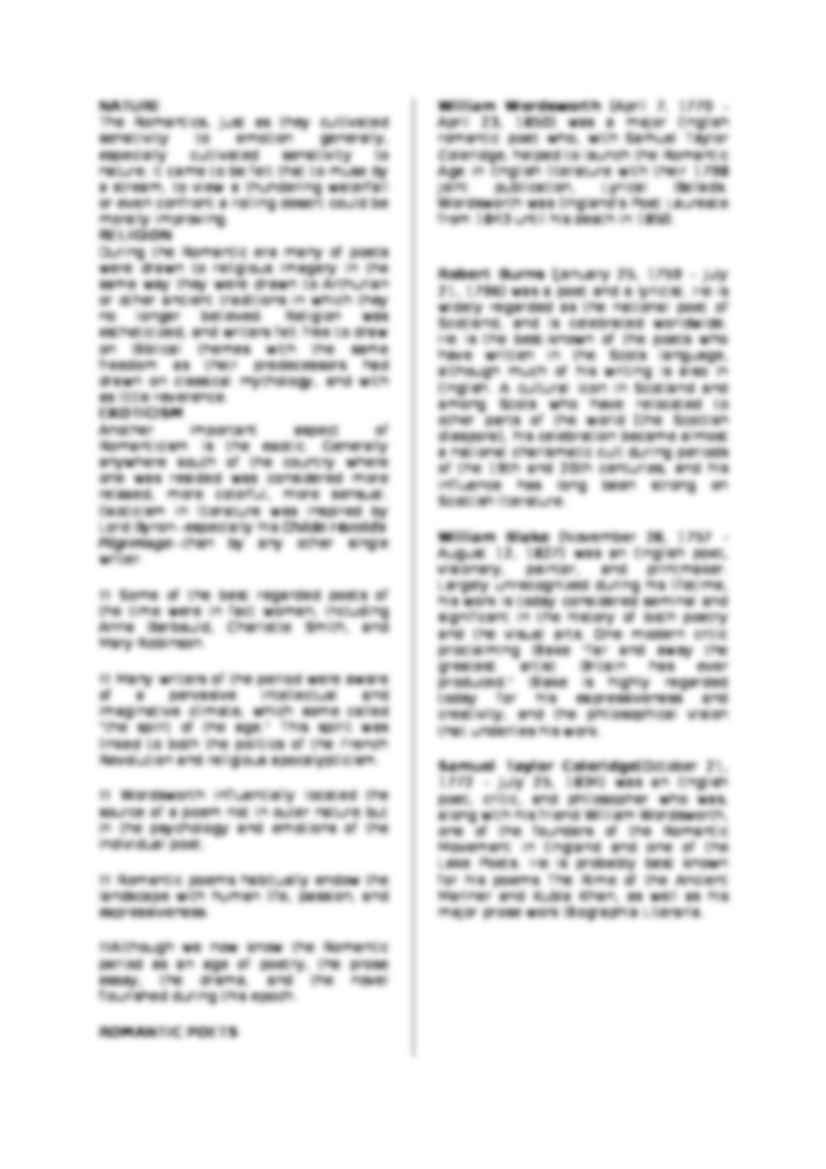ROMANTICISM
Romantic poetry was part of the Romantic movement of European literature during the 18th-19th centuries. Some have attributed the Romantic era of poetry as a reaction against the Enlightenment and the Industrial Revolution. Romantic poetry displays a return to nature by man, which is strongly seen in the works of Wordsworth. Tired of the exhaustion of reason and the search for truth, the Romantics decided to dismiss reason and embrace beauty.The specific use of the term romantic poetry varies, but the most common definition is a movement in poetry seeking formal freedom, increased emotional effect and use of ancient and folk sources for poetry.
Enlightenment vs. Romanticism
ENLIGHTENMENT CHARACTERISTICS
ROMANTICISM CHARACTERISTICS
1.Optimistic: this is the best possible world or at least infinitely improvable through science.
2.Quantity is more important than quality
3.Naturalistic. Nature is fully intelligible to reason.
4.This is true in art (universal, noble, idealized classical themes) as in science vs. history.
5.Classical style: stress static symmetry, order, harmony in nature, society, and the arts; delightful music in major key; artist disappears behind work
6.Formalism and conventionalism best enables art to teach moral lessons.
7.Nature is mechanistic, like clockwork.
1.Pessimistic: life can be full of sorrow; science does nothing for unrequited love, pathos, etc.
2.Quality over quantity
3.Supernaturalistic. Nature is mysterious.
4.Good art is more lifelike, realistic, dynamic, particularized, and emotional.
5.Romantic style is anti-formal, disordered, vague, dynamic, creative, unpredictable, full of conflict and struggle of opposites; minor key, unstable major-minor flips; artist is central; art is an expression of the artist's ego
6.Art should be more natural and spontaneous, down to earth, in touch with real life
7.Nature is spiritual, mental, or organic.
English literature
Although in literature romantic elements were known much earlier, as in the Elizabethan dramas, many critics now date English literary romanticism from the publication of Wordsworth and Coleridge's Lyrical Ballads (1798). In the preface to the second edition of that influential work (1800), Wordsworth stated his belief that poetry results from “the spontaneous overflow of powerful feelings,” and pressed for the use of natural everyday diction in literary works. Coleridge emphasized the importance of the poet's imagination and discounted adherence to arbitrary literary rules.
Such English romantic poets as Byron, Shelley, Robert Burns, Keats, Robert Southey, and William Cowper often focused on the individual self, on the poet's personal reaction to life. The interest of romantics in the medieval period as a time of mystery, adventure, and aspiration is evidenced in the
(…)
… romance and in the historical novels of Sir Walter Scott. England - Big Six: William Blake, Lord Byron, Samuel Taylor Coleridge, Percy Bysshe Shelley, William Wordsworth, John Keats.
The Romantic emphasize:
1. emotion over reason
`poetry is the spontaneous overflow of powerful feelings' (Wordsworth)
2. sensory experience before intellect
`truth is beauty' (Keats)
`show rather than tell'
3. imagination as…
… on Scottish literature.
William Blake (November 28, 1757 - August 12, 1827) was an English poet, visionary, painter, and printmaker. Largely unrecognized during his lifetime, his work is today considered seminal and significant in the history of both poetry and the visual arts. One modern critic proclaiming Blake "far and away the greatest artist Britain has ever produced." Blake is highly regarded today for…
… on Biblical themes with the same freedom as their predecessors had drawn on classical mythology, and with as little reverence.
EXOTICISM
Another important aspect of Romanticism is the exotic. Generally anywhere south of the country where one was resided was considered more relaxed, more colorful, more sensual. Exoticism in literature was inspired by Lord Byron--especially his Childe Harold's Pilgrimage--than…
... zobacz całą notatkę




Komentarze użytkowników (0)